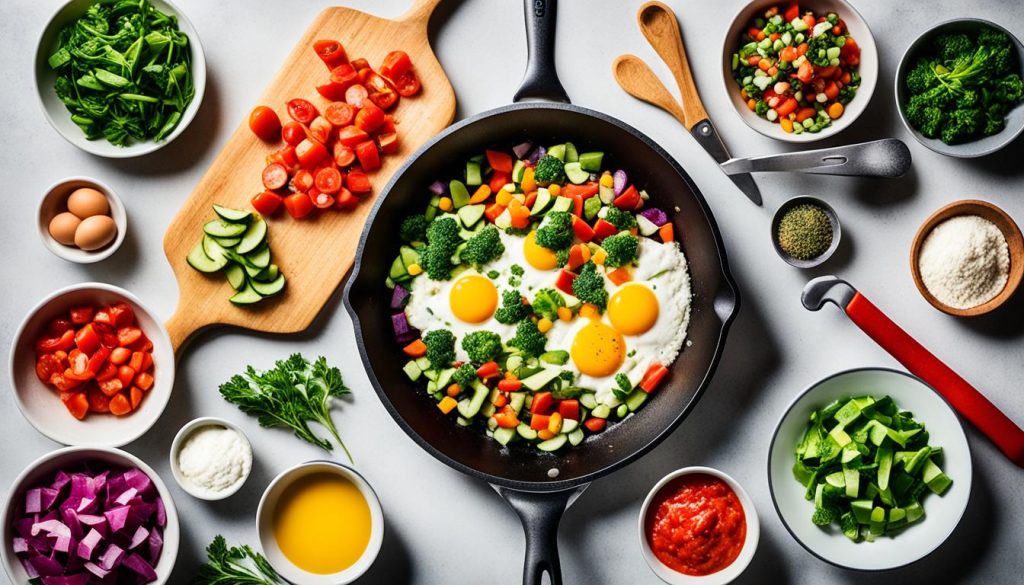Learning the basics of cooking is key for every home chef wanting to improve their skills. These essential techniques and methods are the foundation of cooking. They help cooks make a variety of dishes with ease. By knowing these kitchen essentials, you’ll not only make tasty meals but also feel more confident in the kitchen. This guide will cover the main parts of cooking. It will make sure you’re ready to impress your family and friends with your new skills.
Key Takeaways
- Cooking basics are crucial for mastering culinary skills.
- Understanding fundamental techniques enhances meal preparation.
- Confidence in the kitchen comes from mastering cooking fundamentals.
- Essential kitchen tools are vital for successful cooking.
- Delicious dishes can be created with foundational cooking methods.
Introduction to Cooking Basics
Cooking Basics are key for anyone wanting to dive into culinary adventures. They are vital whether you’re a beginner or a seasoned chef. Learning these essential techniques makes cooking more enjoyable and rewarding.
A Beginner’s Cooking Guide highlights the importance of these basic methods. They help you in the kitchen and spark creativity in making tasty dishes.
Starting with Cooking Basics builds confidence and invites exploration. You can try different cuisines and cooking styles while improving your skills. With time, these techniques become easy, letting you play with flavors and ingredients. Knowing the basics opens up a world of possibilities, making cooking more fun.
Essential Kitchen Tools for Every Home Chef
Having the right tools in your kitchen can make cooking much better. Think about getting quality Kitchen Essentials that help with meal prep. Here are some must-have Cooking Tools for every home chef:
- Chef’s Knife – A sharp, strong knife is key for chopping and slicing.
- Cutting Board – A tough board protects your counters and gives a stable place for food prep.
- Mixing Bowls – Different sizes are great for mixing, marinating, and serving.
- Measuring Cups and Spoons – Precise measuring tools are crucial for tasty dishes.
- Pots and Pans – A variety of these lets you cook in many ways, like sautéing or boiling.
Each tool has its own role, making your kitchen ready for many recipes. With the right Cooking Tools, you can easily cook basic meals and make tasty dishes.
Understanding Cooking Terminology
Every aspiring chef should learn key Cooking Terminology. Knowing these culinary terms helps home cooks follow recipes better. Terms like “sauté,” “blanch,” and “deglaze” make cooking easier and improve kitchen talk.
Here’s a quick look at some basic culinary terms:
- Sauté: Cooking food quickly in a small amount of oil or fat over high heat.
- Blanch: Quickly cooking food in boiling water, then cooling it in ice water. This keeps its color, texture, and nutrients.
- Deglaze: Adding liquid to a pan to remove browned bits and improve sauces.
- Simmer: Cooking food gently in liquid just below boiling point.
- Marinate: Soaking food in a seasoned liquid to make it tastier and softer.
Learning more about these terms helps you in the kitchen. Knowing Cooking Terminology makes cooking simpler and more fun. It turns complex cooking ideas into easy steps.
Basic Cooking Techniques Every Chef Should Know
Improving your cooking skills starts with mastering key techniques. Chopping and dicing ingredients, and sautéing are two important skills. They make food preparation faster and taste better.
Chopping and Dicing Ingredients
Learning to chop and dice ingredients is crucial for beginners. Knowing different cuts can make your dishes more interesting. Here are some cuts to get you started:
- Chop: Cut ingredients into uniform pieces.
- Dice: Make small, even cubes for even cooking.
- Julienne: Slice vegetables into matchstick shapes.
Practicing these skills will make your prep time faster and improve your dish’s look.
Sautéing Basics for Delicious Meals
Sautéing is key for boosting flavors and textures. Start by heating oil in a pan over medium heat. When the oil shimmers, add your ingredients and stir often. This cooks ingredients evenly and brings out rich flavors.
Here are some tips for great sautéing:
- Use fresh ingredients: Choose the freshest vegetables and proteins.
- Don’t overcrowd the pan: This keeps the heat high for browning.
- Season as you go: Adding flavors layer by layer makes your dish taste better.
Improving your sautéing and chopping skills will strengthen your cooking basics.
Cooking Methods: Baking, Boiling, and Beyond
Learning various cooking methods is key for any home chef. Each method adds a special touch to your dishes. You’ll find techniques like baking, boiling, poaching, grilling, and frying. Choosing the right method can turn simple ingredients into unforgettable meals.
Baking techniques are great for desserts and bread. They use dry heat to cook food evenly. This creates a perfect crust and a moist inside. You’ll find recipes for cakes, cookies, and casseroles that need careful timing and temperature.
Boiling is simple and involves cooking food in water or broth. It’s perfect for veggies, pasta, and rice. Boiled foods keep their nutrients, making it a good choice for health-focused cooking.
- Poaching is a gentle way to cook delicate foods like fish and eggs.
- Grilling gives food a smoky taste, great for meats and veggies.
- Frying, whether deep or pan-frying, creates a crispy texture that’s hard to resist.
Exploring these cooking methods can take your recipes to the next level. Learning different cooking methods lets you make a variety of tasty meals with ease.
Healthy Cooking Basics: Nutrition and Ingredients
Learning the basics of healthy cooking is key for better cooking skills and health. It’s important to know about nutrition when preparing meals. By picking fresh, seasonal ingredients, cooks can make tasty meals full of nutrients.
It’s important to know about macronutrients and micronutrients when looking at ingredients. Macronutrients like proteins, carbs, and fats give us energy. Micronutrients, such as vitamins and minerals, help keep us healthy. Balancing these in meals leads to better eating habits.
- Choose Whole Foods: Using whole grains, fresh fruits, and veggies boosts nutrition.
- Understand Seasonality: Produce in season is fresher and tastes better, often with more nutrients.
- Read Nutrition Labels: Get to know the nutrition facts on packaged foods to make smart choices.
By focusing on these tips, cooks can improve their skills and live a healthier lifestyle through cooking.
Mastering Basic Recipes for Every Occasion
Learning Basic Recipes can boost your cooking skills and kitchen confidence. Meal Ideas for Home Chefs are many, but a few key recipes make cooking easier. This part shares recipes great for busy lives, focusing on easy breakfasts and quick dinners.
Simple Breakfast Recipes
A great breakfast starts your day right. Here are some easy recipes:
- Overnight Oats: Mix oats, yogurt, and your favorite fruits in a jar. Let it sit overnight for a quick breakfast.
- Avocado Toast: Mash ripe avocados on whole grain bread. Add salt, pepper, and chili flakes on top.
- Scrambled Eggs: Beat eggs with a bit of milk, then cook in a non-stick pan for fluffy eggs.
Quick Dinner Ideas
These quick dinner ideas are perfect for a busy day:
- Pasta Aglio e Olio: Cook spaghetti and sauté garlic in olive oil. Add red pepper flakes and parsley for taste.
- Stir-Fried Vegetables: Sauté your favorite veggies in soy sauce. Serve over rice or noodles.
- Quesadillas: Put cheese and leftover proteins or veggies in tortillas. Grill until the cheese is melted for a tasty meal.
Culinary Fundamentals: The Importance of Seasoning
Seasoning is key in cooking, making dishes come alive. Without it, even fresh ingredients can taste dull. Learning how to season is crucial to make meals special.
Herbs and spices are the heart of flavor. Adding a bit of salt can make sweet dishes taste better. A sprinkle of black pepper adds warmth. Each herb and spice has its own unique taste, adding depth to food.
Trying out different flavors can make cooking fun. Here are some seasoning tips to keep in mind:
- Taste as you go: Adjust flavors as you cook.
- Layer flavors: Season at different stages for depth.
- Use fresh ingredients: Fresh herbs taste better than dried ones.
Using these techniques makes every dish special. It shows off the beauty of cooking. Each recipe is a chance to use seasoning to create a delicious meal.
Building Kitchen Confidence Through Practice
Building Kitchen Confidence is a journey for every home chef, no matter their skill level. One key Practice Technique is to cook regularly. By setting aside time each week, you can try new ingredients and methods. This helps improve your cooking skills and makes the kitchen feel like home.
Having a positive mindset while cooking is very important. Trying new things and making mistakes can teach you a lot. Remember, mistakes often lead to the best lessons. Trying new recipes can boost your creativity and make you feel proud of what you’ve done.
Adding basic cooking techniques to your daily routine can help you get better. Exploring different cuisines is a great way to learn new flavors and methods. For more tips on improving your cooking skills, this resource offers valuable advice on cooking techniques.
Building Kitchen Confidence takes time and effort. By following these Practice Techniques, you’ll not only get better at cooking but also develop a lifelong love for it.
Cooking Skills for Beginners: Tips and Tricks
Cooking Skills for Beginners can feel overwhelming. But with the right approach, anyone can gain confidence and enjoy cooking. Using kitchen tips can make cooking more fun.
Start by practicing mise en place, a French term meaning “everything in its place.” This means preparing and organizing your ingredients before you begin cooking. It makes cooking faster and less stressful. Take the time to measure, chop, and arrange your ingredients properly for a smooth workflow.
Managing your time well is also key. Make a plan and stick to it while cooking. This helps you handle multiple dishes efficiently and ensures better results.
- Always start with a clean workspace.
- Keep a list of essential kitchen tools handy.
- Practice knife skills regularly to enhance your chopping techniques.
- Experiment with different recipes to improve your cooking skills.
- Don’t be afraid to ask for help or watch cooking tutorials for guidance.
Adding these tips can greatly improve cooking for beginners. Aim for organization and efficiency. With practice and a positive attitude, anyone can become skilled at cooking basics.
Exploring Cultural Cooking Basics
Diving into Cultural Cooking Basics opens up a world of flavors and techniques. It makes the culinary experience richer. Every region has its own mix of ingredients, methods, and traditions. These differences make each cuisine unique.
By embracing these differences, we improve our taste and get creative in the kitchen. It’s a journey that invites home chefs to try new recipes. It encourages them to experiment with:
- Traditional Asian stir-frying techniques that keep nutrients in and add vibrant flavors.
- Italian pasta-making practices, focusing on fresh ingredients.
- Mexican blending of spices and herbs, creating complex and satisfying tastes.
Learning various cultural cooking techniques is key to improving cooking skills. Each technique has a story of the people and traditions behind it. As chefs explore more, they gain a deep understanding of Cooking Basics. This turns everyday meals into special experiences.
Cooking Basics: Summary of Key Techniques
Learning the key techniques in cooking is vital for any chef. This review covers basic skills that are crucial for cooking well. With practice, these skills become easy and fun.
Here are some important techniques to keep in mind:
- Chopping and Dicing Ingredients: Being good with a knife means your food cooks evenly and looks great.
- Sautéing: This method uses heat to mix flavors together perfectly.
- Boiling and Baking: These are basic ways to cook that are very useful.
- Seasoning: Knowing how to add flavor can make meals much better.
This Cooking Basics Review highlights these key techniques and encourages ongoing learning. By mastering these skills, you can be more creative and express yourself in the kitchen.
Conclusion
In this Cooking Basics Wrap-Up, we’ve looked at the key techniques and skills needed for great cooking. Learning these basics is crucial for any home chef starting out. We covered everything from important kitchen terms to the must-have tools every cook should know.
But the journey to becoming a great cook doesn’t stop here. It’s a path of ongoing practice and discovery. A Culinary Skills Summary helps you think back on what you’ve learned and improve your cooking. Every new dish you try makes you more confident and skilled.
Remember, the kitchen is where you can have fun and try new things. Don’t be afraid to experiment and let your love for cooking grow. With the skills we’ve talked about, you’re ready to become a skilled home chef. Enjoy your cooking journey!



